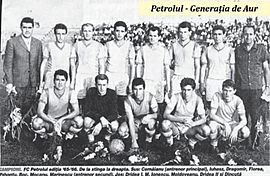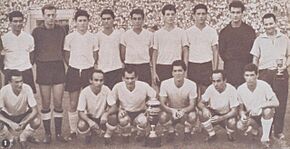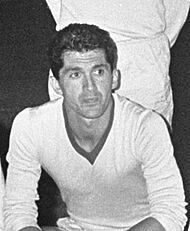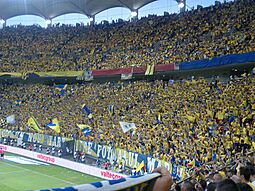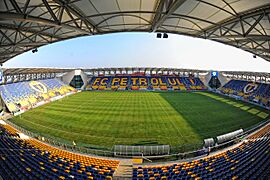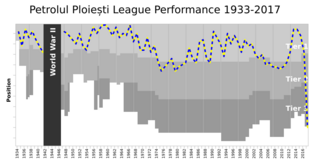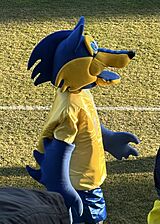FC Petrolul Ploiești facts for kids
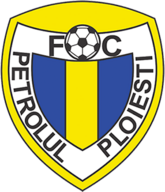 |
||||
| Full name | Asociația Clubul Sportiv Petrolul 52 | |||
|---|---|---|---|---|
| Nickname(s) |
|
|||
| Short name | Petrolul | |||
| Founded | 31 December 1924 as FC Juventus București |
|||
| Ground | Ilie Oană | |||
| Capacity | 15,073 | |||
| Owner | Asociația Clubul Sportiv Petrolul 52 | |||
| Chairman | Claudiu Tudor | |||
| Head coach | Liviu Ciobotariu | |||
| League | Liga I | |||
| 2024–25 | Liga I, 9th of 16 | |||
|
||||
FC Petrolul Ploiești is a professional football club from Ploiești, Prahova County, Romania. The team is also known as Petrolul Ploiești or simply Petrolul. They play in Liga I, which is the top football league in Romania.
The club started in 1924 in Bucharest as Juventus. It was formed by combining two other teams, Triumf and Romcomit. Petrolul won its first league championship in the 1929–30 season. In 1952, the club moved to Ploiești and changed its name to Petrolul in 1957. They won three more national titles in 1957–58, 1958–59, and 1965–66. Petrolul has also won the Cupa României (Romanian Cup) three times, most recently in the 2012–13 season.
Petrolul first played in a European competition in the 1958–59 season. They played against a team from East Germany called Wismut Karl Marx Stadt in the European Cup. The club has played in European competitions 12 times in total, with eight of those being under UEFA rules.
Petrolul's team colors are yellow and dark blue. This is why their players and fans are often called "the Yellow Wolves". The team plays its home games at the Ilie Oană Stadium, which opened in 2011 and can hold 15,073 fans. Petrolul has a big rivalry with Rapid București, which is known as the Primvs derby. They also had a local rivalry with Astra Giurgiu from 1998 until 2012, when Astra moved away from Ploiești.
Contents
Club History
| Time Period | Team Name |
| 1924–1947 | Juventus București |
| 1947–1948 | Distribuția București |
| 1948–1949 | Petrolul București |
| 1949–1950 | Competrol București |
| 1950–1951 | Partizanul București |
| 1951–1952 | Flacăra București |
| 1952–1956 | Flacăra Ploiești |
| 1956–1957 | Energia Ploiești |
| 1957–Present | Petrolul Ploiești |
How the Club Started (1924–1952)
The team was created in Bucharest in late 1924. Two clubs, Romcomit and Triumf, joined together to form Juventus București. This new club became very famous in the capital city between the two World Wars. The club's badge showed a she-wolf nursing Romulus and Remus, which is a famous story about the founding of Rome. Juventus took over Romcomit's stadium and their red and blue colors.
In their first season, the team finished 4th in the Bucharest championship. Their first game was on March 8, 1925, a 3–0 win against Colțea București. Before the next season, the club played its first international friendly matches. They won against Slavia Prague (2–1), Slavia Sofia (3–0), and Vasas Budapest (5–2). In the Bucharest regional championship, they finished 1st. This allowed them to play in the 1925–26 Divizia A final, where they lost to Chinezul Timișoara.
Their first national title came six years after the club was founded. They won another Bucharest regional championship and then the 1929–30 Divizia A final. They beat Gloria Arad 3–0. After this, the club played in the top league, Divizia A, for seven seasons in a row, from 1933 to 1940. After World War II, they were promoted back to the top league. The club played its last season as Juventus in 1946–47. After that, its name changed many times, including Distribuția, Petrolul, Competrol, Partizanul, and Flacăra.
Moving to Ploiești and Winning Titles (1952–1968)
The team Flacăra București moved to Ploiești in 1952 and was renamed Flacăra Ploiești. Coach Ilie Oană took over the team during the 1952 season. He couldn't stop them from being relegated, but they did reach the cup final, which they lost 0–2 to CCA București. In the 1957–58 season, the team became champions of Romania for the second time. This was also the season when they adopted their current name, Petrolul Ploiești.
In the autumn of 1958, Petrolul played its first game in the European Cup. They faced Wismut Karl Marx Stadt from East Germany. After losing 4–2 away, they won 2–0 at home, making the score even. However, Wismut Karl Marx Stadt won a deciding play-off game 4–0 in Kyiv. Petrolul won its second league championship in a row in the 1958–59 Divizia A season. They again couldn't get past the first round of the European Cup, losing to Austrian team Wiener Sport-Club.
On July 14, 1963, Petrolul player Constantin Tabarcea sadly collapsed and died during a Divizia A match. One week later, Petrolul won the 1962–63 Cupa României 6–1 against Siderurgistul Galați. Before the game, they left a space open in the team photo to remember Tabarcea. In 1965, head coach Ilie Oană left to coach the Romanian national team. His assistant, Constantin Cernăianu, took over. In his first season, Cernăianu led the club to its fourth Divizia A trophy, finishing six points ahead of Rapid București. October 12, 1966, was a special day for the team. After losing 0–2 away, Petrolul won 3–1 at home against the English champions, Liverpool. However, Liverpool won the third match in Brussels and advanced in the European Cup.
A Challenging Period (1968–1990)
After their successful period, Petrolul faced a time of decline. Even though the club stayed in the first division for many years, only the 1995 Romanian Cup final reminded fans of their glory days. In 1974, Petrolul was relegated to Divizia B. This happened after some issues, including suspicions of match-fixing involving other teams.
When they were in the second division, some of their best players left. The team struggled for a while. In 1976, Valentin Stănescu became the coach, and the team tried to get promoted. They had a great 1976–77 season, finishing in 1st place. However, they were relegated again after the 1977–78 Divizia A season.
Promotion back to the top league was difficult. In 1980, Petrolul brought in a new coach, Traian Ionescu. But another team, CS Târgoviște, got a famous player, Nicolae Dobrin, who helped them get promoted instead. In 1982, after four years in the second league, Petrolul finally returned to Divizia A.
The 1982–83 Divizia A season was full of excitement as the team fought to avoid relegation. In the 1983–84 season, Petrolul was relegated again. But they quickly got promoted back in 1985. In 1987, Petrolul was relegated once more. In 1989, Petrolul was promoted again and finished 4th in their first season back in the top league.
European Games and Cup Wins (1990–2002)
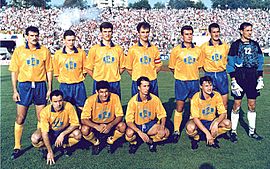
After returning to the top division in 1989, Petrolul finished 4th in the 1989–90 Divizia A season. This meant they qualified for the UEFA Cup. "The Yellow Wolves" played against the Belgian club Anderlecht, who won both games. In the 1990–91 season, Petrolul finished 7th.
In the summer of 1991, the club changed its name to FC Ploiești for a short time. They had a tough season, finishing 10th. After that season, FC Ploiești changed its name back to Petrolul Ploiești. In the 1992–93 season, "the Oilmen" barely avoided relegation. The next season, with coach Marin Ion, they had a very good year and finished 5th.
In the 1994–95 season, even though they finished 10th in the league, Petrolul won the 1994–95 Cupa României! They beat their rivals, Rapid București, in a penalty shootout. This win qualified them for the 1995–96 UEFA Cup. In Europe, they beat Welsh team Wrexham in the first round. However, they were knocked out in the second round by Austrian team Rapid Wien. In the league, Petrolul finished 6th.
In the late 1990s, there was a strong rivalry with Astra Ploiești, a team that was promoted to the first league in 1998.
Challenges in the Second Division (2002–2011)
In the early 2000s, Petrolul faced financial difficulties. In 2002, the team was relegated to Divizia B. Ploiești, which used to have two teams in the top league, was left with only Astra. Petrolul was promoted back to Divizia A in 2003 after just one season. However, soon after, the club's funding became uncertain. There was a plan to merge Petrolul Ploiești with Astra Ploiești.
Astra Ploiești changed its name to Petrolul Ploiești. In July 2003, the original Petrolul Ploiești club was removed from the Romanian Football Federation. On July 28, 2003, Astra Ploiești officially changed its name to FC Petrolul Ploiești. This new club took over the Petrolul brand and history. Petrolul also moved back to its old stadium, Ilie Oană Stadium, in 2004.
The 2004 relegation started a tough period for the "yellow wolves," with seven seasons in Liga II. In the 2004–05 season, they finished 4th. In 2006, the club decided to play home games at other stadiums because the old Ilie Oană Stadium needed repairs. Fans protested, asking for the team to be owned by the city and to return to their home ground. Despite these issues, Petrolul had good seasons but kept finishing just below the promotion spots.
In 2009, the Ploiești Municipality took over the team. Valeriu Răchită, a former player, became the coach. The team was rebuilt with many young players. In the 2009–10 season, Petrolul finished 3rd, just one point away from promotion. This was a big disappointment for the fans.
Petrolul made important changes for the 2010–11 season. Experienced players joined the young squad. They moved their home matches to Conpet Stadium near Ploiești while the new Ilie Oană Stadium was being built. After a tough fight, Petrolul was promoted from 1st place! This promotion happened at the same time as the new stadium opened, bringing great excitement to everyone involved with the club.
Success and Later Challenges (2011–2016)
Under coach Cosmin Contra, Petrolul finished third in the league and won the national cup for the third time. This earned them a spot in the 2013–14 UEFA Europa League. They beat Víkingur Gøta and Vitesse Arnhem but were eliminated by Swansea City in the play-off round.
The team gained a lot of attention in January 2014 when they signed famous Romanian players Adrian Mutu and Ianis Zicu. Also, the German car company Opel became Petrolul's shirt sponsor. Petrolul reached the semi-finals of the Cupa României but lost to rivals Astra Giurgiu. They finished third in Liga I again.
In their next European competition, "the Yellow Wolves" played against Czech club Viktoria Plzeň in the Europa League third qualifying round. After a draw at home, Petrolul won impressively 4–1 away. However, they again missed reaching the group stage after losing to Dinamo Zagreb. In September 2014, coach Lucescu was fired, and Mutu left the club. In November, some club officials faced legal issues, which caused Petrolul to lose important players and become unstable. In February 2015, the club faced financial problems and finished the season in sixth place.
More players left the club in the summer of 2015, and coaches changed often. Petrolul quickly dropped to the last place in the league and stayed there. In the summer of 2016, the team was declared bankrupt.
Rebuilding and Recent Times (2016 onwards)

After the team was dissolved in 2016 due to bankruptcy, club legends and fan groups quickly worked to restart it. They named it ACS Petrolul 52 Ploiești and entered it into the Liga A Prahova (Liga IV), which is the fourth level of Romanian football. In early 2017, the French company Veolia became a financial partner.
In June 2017, ACS Petrolul 52 rented the club's brand name from the Ploiești Municipality and started using the name FC Petrolul Ploiești again. The team achieved promotions two years in a row, reaching the second division in the summer of 2018. After three tries to return to Liga I and with results getting worse each year, Veolia stopped fully funding Petrolul.
Despite financial issues after Veolia left, the team, led by coach Nicolae Constantin, won the Liga II championship. Petrolul finished eighth in the regular season of the 2022–23 Liga I. In March 2023, the group of former players who controlled the club stepped down. Marian Copilu became the new owner. Petrolul also finished the 2022–23 season in eighth place overall.
Starting from the 2024–25 season, Petrolul created a reserve team through a partnership with Daniel Chiriță. This team plays in the third league at the Stadionul Conpet in Strejnic.
Home Stadium
Petrolul Ploiești plays its home matches at the Ilie Oană Stadium. This stadium is a UEFA Category 4 stadium, which means it can host big European matches like UEFA Europa League semi-finals. It opened in September 2011 and can hold 15,073 fans. The stadium was built where the old Ilie Oană Stadium used to be, which was completed in 1937. It is named after Ilie Oană, who was the most important coach in Petrolul's history.
Stadium Highlights
- The first match played at the new stadium was a special game between former Petrolul Ploiești players (who won the Romanian Cup in 1995) and a team of former Romanian international players. The former international players won 4–3. The first goal scored on this stadium was by Cristian Zmoleanu.
- Petrolul's first official match at the stadium was a Liga I game against Dinamo București on September 25, 2011. Dinamo won 5–1. Dinamo player Cosmin Moți scored the first official goal at the new Ilie Oană Stadium.
- The Romania national football team played its first official match at the Ilie Oană Stadium on March 29, 2015, against the Faroe Islands.
Fan Support
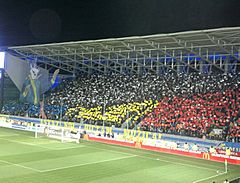
Petrolul Ploiești has many loyal fans in Prahova County. Their strong support for the team is well-known in Romania, no matter how the team is doing.
The largest group of dedicated fans is called Lupii Galbeni ("the Yellow Wolves"), formed in 1996. There are also other fan groups in different parts of the stadium, like Peluza Latină ("The Latin Stand") and Peluza 1 Ilie Oană ("Peluza 1 Ilie Oană stand"). Other fan associations are located in the Second Stand. Before and during matches, fans sing the club's songs, with lyrics written by George Nicolescu.
Petrolul Ploiești fans have also become friends with supporters of other clubs, including Oțelul Galați in Romania, and international clubs like Vitesse (Netherlands), Salernitana (Italy), and Genk (Belgium).
Team Rivalries
Petrolul Ploiești's main rival is Rapid București. They first played each other on November 11, 1931. This rivalry has stayed strong even when one team was in a lower division. In the 1965–66 season, Petrolul won the league, and Rapid finished second. The next year, Rapid won its first national title at the old Ilie Oană Stadium. These events helped make the rivalry even stronger. Because this is the oldest rivalry between active Romanian teams, it's known as the Primvs derby, which means "first" or "foremost" in Latin.
Petrolul also had a rivalry with Astra Giurgiu, which used to be a local team. Astra was promoted to Liga I in 1998 and played in Ploiești until September 2012, when they moved to Giurgiu. The rivalry continued between the clubs' managements until Astra stopped playing in October 2022.
Petrolul fans also have strong feelings against other big Bucharest teams, such as FCSB, Dinamo, and CSA Steaua. They sometimes chant against these teams even when they are not playing them directly.
Club Achievements
National Titles
- Divizia A / Liga I
- Winners (4): 1929–30, 1957–58, 1958–59, 1965–66
- Runners-up (3): 1925–26, 1955, 1961–62
- Divizia B / Liga II
- Winners (9): 1940–41, 1953, 1976–77, 1981–82, 1984–85, 1988–89, 2002–03, 2010–11, 2021–22
- Runners-up (1): 1980–81
- Liga III
- Winners (1): 2017–18
- Cupa României
- Winners (3): 1962–63, 1994–95, 2012–13
- Runners-up (1): 1952
- Supercupa României
- Runners-up (2): 1995, 2013
Regional Titles
- Liga IV – Prahova County
- Winners (1): 2016–17
- Cupa României – Prahova County
- Winners (1): 2016–17
Other Wins
- Bangladesh President's Gold Cup
- Champions (1): 1993
Players
Current First Team Squad
|
Players on Loan
|
Club Officials
Team Kits and Sponsors
| Time Period | Kit Manufacturer | Shirt Sponsor |
|---|---|---|
| 1924–1998 | Unknown | Unknown |
| 1998–2001 | Meding Sport | Petrom |
| 2001–2003 | Adidas | |
| 2003–2004 | Lotto | |
| 2005–2008 | ||
| 2008–2009 | Team | Petrom |
| 2009–2010 | Consiliul Local Ploiești | |
| 2010–2011 | Hummel | |
| 2011–2012 | Adidas | |
| 2012–2013 | Macron | Romprest |
| 2013–2014 | Puma | Opel |
| 2014–2015 | Nike | |
| Alexandrion | ||
| 2015–2016 | Superbet | |
| 2016–2017 | Errea | Viking Pruszyński |
| 2017–2022 | Joma | Veolia |
| 2022–2023 | Adidas | MRS |
| 2023–present | Macron | La Cocoș |
European Games Record
Petrolul Ploiești has played in 8 European club competitions organized by UEFA. In total, they have played in 12 European competitions.
| Competition | S | P | W | D | L | GF | GA | GD |
|---|---|---|---|---|---|---|---|---|
| UEFA Champions League / European Cup | 3 | 8 | 2 | 1 | 5 | 8 | 15 | −7 |
| UEFA Cup Winners' Cup | 2 | 6 | 2 | 2 | 2 | 4 | 7 | −3 |
| UEFA Europa League / UEFA Cup | 3 | 14 | 7 | 2 | 5 | 25 | 20 | +5 |
| UEFA Intertoto Cup | 1 | 6 | 1 | 1 | 4 | 6 | 14 | −8 |
| Inter-Cities Fairs Cup | 3 | 13 | 9 | 0 | 4 | 14 | 11 | +3 |
| Total | 12 | 47 | 21 | 6 | 20 | 57 | 67 | −10 |
Important Wins
| Season | Match | Score | |
|---|---|---|---|
| European Fairs Cup | |||
| 1962–63 | Petrolul – |
1 – 0 | |
| 1967–68 | Petrolul – |
2 – 0 | |
| European Cup Winners Cup | |||
| 1963–64 | Petrolul – |
1 – 0 | |
| European Cup / Champions League | |||
| 1966–67 | Petrolul – |
3 – 1 | |
| European Intertoto Cup | |||
| 1990 | Petrolul – |
3 – 2 | |
| UEFA Cup / Europa League | |||
| 2013–14 | Petrolul – |
2 – 1 | |
| 2013–14 | Petrolul – |
2 – 1 | |
| 2014–15 | Petrolul – |
4 – 1 | |
League Performance History
|
|
Famous Former Players
These players have played for their national teams or have played over 100 games for FC Petrolul Ploiești.
 Mircea Dridea
Mircea Dridea Mihai Ionescu
Mihai Ionescu Adrian Mutu
Adrian Mutu Valeriu Răchită
Valeriu Răchită Constantin Tabarcea
Constantin Tabarcea Jair
Jair Takayuki Seto
Takayuki Seto
Famous Former Coaches
 Cosmin Contra
Cosmin Contra Ilie Oană
Ilie Oană Răzvan Lucescu
Răzvan Lucescu Valeriu Răchită
Valeriu Răchită
Women's Football Team
Since the 2020–21 season, Romanian top-league clubs must have women's football teams to get a license. This includes having at least 20 players for the U15 Women's National Championship. From the 2021–22 season, clubs also need a senior women's team in a league.
In 2022–23, Petrolul Ploiești worked with ACS Student Sport Alba Iulia to play in the women's third league under Petrolul's name. Their junior and senior teams in Ploiești only played friendly matches.
In 2023–24, Petrolul started its first official women's team in the Women's third League. They played at various stadiums in Ploiești. After the Romanian Football Federation changed the women's leagues, Petrolul was invited to join the women's second league for the 2024–25 season.
Women's Team Kits and Sponsors
| Time Period | Kit | Sponsor |
|---|---|---|
| 2023–Present | Adidas | MRS |
Women's Team Coaches
- 2022 Cristian Iordache
Women's Team League History
| Season | Level | League | Place | National Cup |
|---|---|---|---|---|
| 2024–25 | 2 | Women's 2nd League | Seria 1 - 6 | Group Stage |
| 2023–24 | 3 | Women's 3rd League | Seria 2 - 2 | 3rd Round |
| 2022–23 | 3 | Women's 3rd League | Seria 1 - 5 | 1st Round |
See also
 In Spanish: Fotbal Club Petrolul Ploiești para niños
In Spanish: Fotbal Club Petrolul Ploiești para niños
 | Ernest Everett Just |
 | Mary Jackson |
 | Emmett Chappelle |
 | Marie Maynard Daly |


